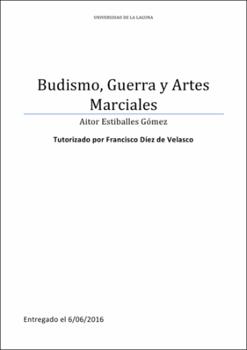Budismo, Guerra y Artes Marciales
Autor
Estiballes Gómez, AitorFecha
2016Resumen
El budismo y la cultura de la violencia no parecen guardar aparentemente ninguna relación entre sí,
aunque el desarrollo de las artes marciales en los países budistas emerge como un proceso paralelo
que difícilmente puede separarse de la vida espiritual. Estas se desarrollaron a la par que el budismo
zen (chan en China) y se constituyeron como elaborados sistemas de militarización. La paradoja
surge cuando estos dos mundos, teóricamente inconexos, se entremezclan para dar un nuevo sentido
ético y religioso. El budismo y su extensa propagación por los países de Oriente no ha conseguido
que desaparezca la actitud belicosa de las políticas de estado, sino que en muchos casos se ha
convertido en un cuerpo sumiso y legitimador de acciones violentas. En este trabajo se mostrarán
dichas contradicciones y cómo éstas confluyen a lo largo de la historia para ofrecer otra cara u otras
vías de conceptualización de la vida espiritual en un contexto de violencia. Con lo cual atenderemos
a un proceso de adaptación del contenido teológico que acabará por formar parte de una ideología
que respalda el conflicto y la guerra. Buddhism and violence culture does not apparently seem to have any relation between them, but the
development of martial arts in Buddhist countries emerge like a paralel process that hardly can be
separated from the spiritual life. These (martial arts) developed at the same time as Zen Buddhism
(Chan in China) and they became elaborated systems of militarization. The paradox appears when
these two worlds, theoretical far apart, mixed between them to give a new sense in a religious and
ethic way. Buddhism and its great extension in oriental countries has not been able to get rid of the
warlike attitude of the state politics, but in many cases it has become a submissive and legitimate
body of violent actions. In this work these contradictions will be analysed and how they have met
along history to offer another face or another way to understand spiritual life in a violence context.
Hence we will be witness of an adaptation process of teological content that will become an
ideology that support war and conflict.




